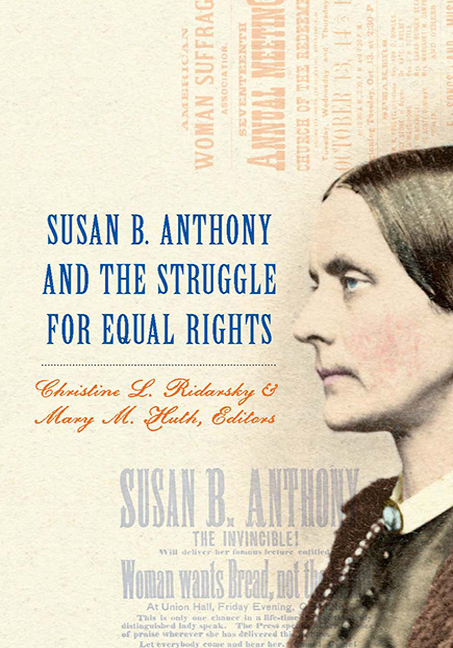Book contents
- Frontmatter
- Dedication
- Contents
- Preface
- Introduction
- Part 1 Constructing Memory
- Part 2 Anthony and Her Allies
- Part 3 Broadening the Boundaries of the Equal Rights Struggle
- Chapter 4 Others and Origins: Nineteenth-Century Suff ragists and the “Indian Problem”
- Chapter 5 Frances Watkins Harper and the Search for Women's Interracial Alliances
- Chapter 6 The Ladies’ Land League and the Labor Question: Irish-American Women and Social Reform in the Late Nineteenth Century
- Part 4 Reconstructing Memory
- List of Contributors
- Index
Chapter 5 - Frances Watkins Harper and the Search for Women's Interracial Alliances
from Part 3 - Broadening the Boundaries of the Equal Rights Struggle
Published online by Cambridge University Press: 09 May 2017
- Frontmatter
- Dedication
- Contents
- Preface
- Introduction
- Part 1 Constructing Memory
- Part 2 Anthony and Her Allies
- Part 3 Broadening the Boundaries of the Equal Rights Struggle
- Chapter 4 Others and Origins: Nineteenth-Century Suff ragists and the “Indian Problem”
- Chapter 5 Frances Watkins Harper and the Search for Women's Interracial Alliances
- Chapter 6 The Ladies’ Land League and the Labor Question: Irish-American Women and Social Reform in the Late Nineteenth Century
- Part 4 Reconstructing Memory
- List of Contributors
- Index
Summary
Frances Ellen Watkins Harper (1825–1911) was a prominent abolitionist and woman's rights activist whose career bridged the antebellum and post–Civil War eras. Harper's advocacy, during and after Reconstruction, of woman suffrage, prohibition of alcohol, federal funding for education, and civil rights protections for black Americans reflects her increasing insistence on federal intervention in social problems and suggests why she turned to the largest women's organization in the United States during the nineteenth century, the Woman's Christian Temperance Union (WCTU), as an organizational base. Founded in 1874, the WCTU's commitment to the expansion of federal power after the end of Reconstruction explains its value to black women like Harper, who joined the WCTU because she agreed with its strategy of calling upon the federal government to help solve the country's social and moral problems, especially through constitutional amendments for woman suffrage and the prohibition of alcohol. Harper also recognized its large membership base as a potentially powerful site for interracial cooperation and appreciated its focus on Christian reform and the protection of children. Her activism demonstrates a larger trend that emerged among politically active black women and men who were determined to hold the government to its commitment to civil rights in the years after Reconstruction. To do so, they involved themselves in issues and organizations that helped refocus attention on the positive possibilities of federal power.
Although many of Frances Harper's writings have been collected in edited volumes, there has been relatively little scholarship on her, especially by historians. Some literary scholars have focused on her place in the canon, her strengths as a poet, and her status as the most popular African-American orator and poet in the nineteenth century. Other literary scholars have done interesting work on the politics of women's sentimental writing in the nineteenth century, a category in which Harper's writing is placed. Historians of Harper have primarily focused on her role as an abolitionist and on her work during Reconstruction but have largely neglected her later activism, when she was a leader in the WCTU. Even scholars of the WCTU have ignored Harper's role in the organization. Particularly neglected is the decade of the 1880s, when Harper worked to create a viable interracial alliance as the WCTU's national superintendent of “Work among Colored People.”
- Type
- Chapter
- Information
- Susan B. Anthony and the Struggle for Equal Rights , pp. 145 - 171Publisher: Boydell & BrewerPrint publication year: 2012



